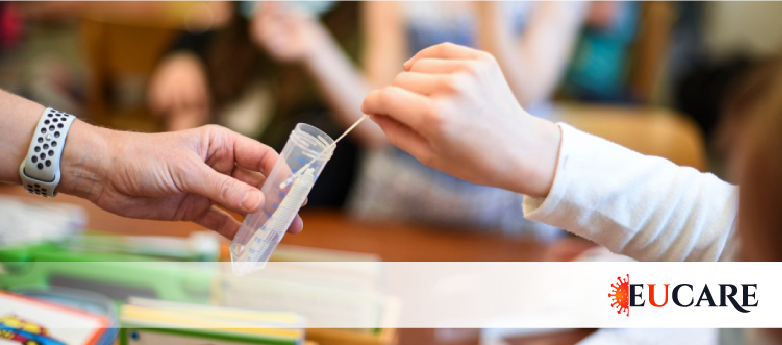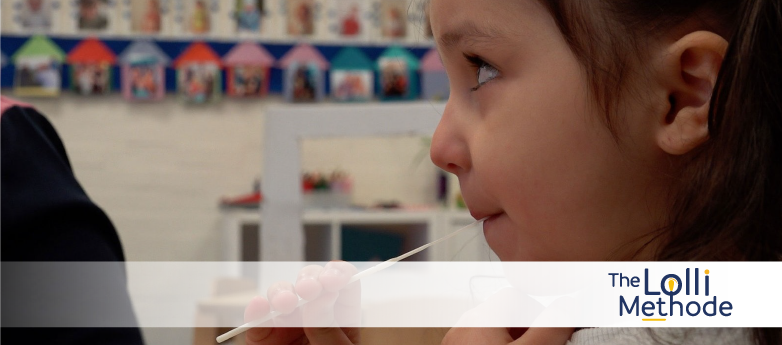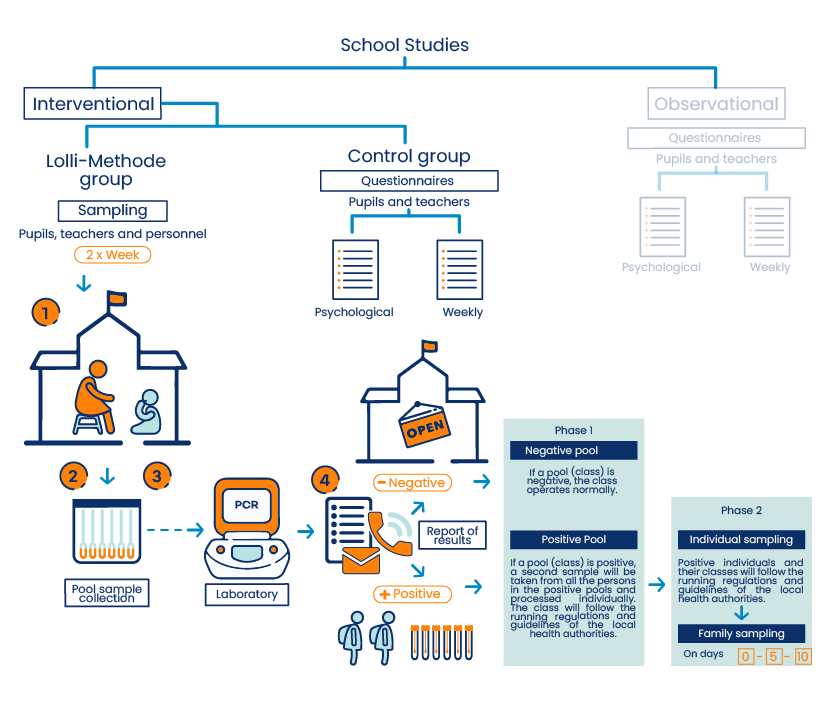THE INTERVENTIONAL LOLLI STUDY
The Interventional Lolli study has been designed to evaluate the emerging saliva based methodology for screening “Lolli-Methode”, as well as epidemiological aspects, containment measures and psychological effects of the SARS-COV-2 epidemics in schools. scientists and student representatives.

OBJECTIVES OF THE INTERVENTIONAL LOLLI STUDY
Primary aim
• To determine if regular screening with pooled saliva tests (Lolli-Methode) is useful to support school opening and to reduce clusters and attack rates in schools, compared with regular surveillance based on symptoms (standard of care).
Secondary aims
- To determine the prevalence of SARS-COV-2 in schools with new variants, frequencies and size of clusters and attack rates in schools, compared with different waves and by socio-economic status and distance from school / mobility issues.
- To investigate the psychological dimension related to preventive measures and distant learning in pupils and teachers, taking into account the socio-economic status.
- To investigate learning loss in association with preventive measures, psychological and socio-economic status and demographic features.
- To compare the effectiveness of different protocols of contact tracing and of different preventive measures adopted in different schools taking into account variants and vaccination (preventive measures include: one vs two meters of distance, wearing masks, preventive measure during lunch time, use of bubbles, extra-scholar activities).
- To verify whether the positive cases at school were caused by transmission within the school and the secondary transmission attack for households.
- To evaluate the usefulness of the schools as sentinel testing sites for community detection and control of SARS-COV-2 epidemics.
THE LOLLI-METHODE
Developed by the Institute of Virology at the University of Cologne, the Lolli-Methode is a saliva based pooled screening program for kindergartens and schools.
Pupils including babies are asked to suckle a swab like a lollipop for 30 seconds. The swabs are pooled by class, that is all pupils and teachers in a class are analysed in a single pool by a conventional PCR test.
The sensitivity of the pooled method was evaluated and found comparable with the standard method, namely individual nasopharyngeal swabs analysis.
If the pool results are negative, no further action is needed. In case of a positive pool, all the pupils and teachers of the group redo the Lolli-procedure with a second swab which is now analysed individually.

Given the small positive rate in schools, this methodology is significantly more affordable in terms of logistics and costs with respect to separate analysis of individual swabs. Teachers and pupils are tested twice a week for early detection of infection, which could make the system more timely with respect to contact tracing protocols.
After a successful pilot in 32 kindergartens and 20 schools in Cologne in 2021, the Lolli-Methode screening program was extended to the whole North Rhine-Westphalia region in Germany and to the Mexican region of Tabasco, involving overall almost 4000 schools.
HOW DOES THE STUDY WORK?
When a school participates in the Lolli study, the classes of the school are randomly assigned to two groups of the same size: one group, called the experimental or Lolli group, will follow the Lolli-Methode, with pooled saliva screening twice a week; the other group, called the control group, will follow the routine standard of care as defined by the running regulations in the region in the specific period.
Families of positive pupils in the experimental (Lolli) group are offered individual lolli analysis for all the households.
In both groups the pupils (or their parents if they are too young) and the teachers are asked to fill psychological questionnaires at the beginning and at the end of the study period. Teachers and families are asked to fill out simple weekly questionnaires with complementary information.
The study is organised in two periods of three months.
Data will be analysed by advanced classical statistical/epidemiological methods and compared with retrospective data on previous pandemic waves.
Data will be also analysed by advanced artificial intelligence methods.
At the end of the study, each school will receive a specific report on the results of the “psychological” study in the school itself.
Participation is on a voluntary basis. Participants can withdraw their consent to participate at any moment.

